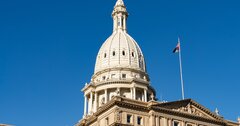

People should notice that the candidates running to represent them are not promising to do much. More than in the past, this election doesn’t seem to be about policy. Yet candidates are taking tough stances. Interest groups have gotten candidates to state their views on the issues that interest groups care about. And voters will never be told how much their candidates have deferred their judgment to special interests.
Check out campaign web sites this election to confirm this observation. They are filled with candidates trying to say popular things. They like jobs and don’t like inflation. What they are going to do about jobs and inflation if elected is unstated. Or too vague to matter. Voters get little information on what their candidates will do.
Special interests, on the other hand, will know a lot more about candidates’ positions.
Every major interest group in the state capital and in Washington has, at the very least, a questionnaire they use to get candidates to state where they stand on the issues the interest group cares about.
Candidates who want an endorsement and campaign contributions may also sit in to be interviewed by lobbyists. This can clear up any ambiguity in their stances, and it gives lobbyists a chance to dig in on precisely what they expect from a candidate.
The candidates most aligned with the interest group’s agenda can get endorsements, campaign cash, some ads run by the groups rather than campaigns, and maybe even some people to help knock on doors. In exchange, the interest groups get candidates who are on board with what they want.
This is an acceptable part of American democracy. Lobbyists aren’t doing anything that typical Americans couldn’t do if they banded together around shared interests. People are entitled to engage on issues, express their speech, and support the candidates they want.
The lobbying, endorsements, campaign contributions and other political support gives special interests access that typical voters do not get. They get to know where candidates stand on their issues.
Construction unions are going to know where a candidate stands on mandates for union scale wages on government construction projects. Good luck finding that out from a candidate’s campaign.
Beverage wholesalers and distributors are going to know whether candidates care about all the favors given to wholesalers and distributors. That’s not going to be part of any mailer.
The film lobby will know who is going to spend their political capital, if elected, to get taxpayers to pay 30% of the costs to shoot a film in Michigan. This won’t be featured in the candidate’s television spots.
Voters may never be told what promises their candidates have made. They will not know how far candidates go to solicit the support of the people who endorse them.
This is a problem because a lot of voters may not like the stances that their candidates have taken. Are they committed to the latest corporate welfare schemes? Or to skim money for unions out of Medicaid payments? Or the many other bad ideas that special interests advocate? These are important issues that voters may want to express their opinion about in the ballot boxes.
This election will establish policies to be enacted in the upcoming year. Candidates have taken stances. They’ve made pledges and won endorsements. Sometimes both candidates and interest groups would prefer to keep what they’ve said quiet; it may hurt their chances of victory.
Here are some recommendations to voters for the upcoming election. Instead of checking out the issues page on candidate web sites, check out their endorsements. And then check out what the endorsing groups want.
But there’s a broader lesson, too. Candidates are going to be stingy about sharing their stances on issues this election because voters don’t seem to care. Voters have to want candidates who take stances on issues. Maybe next time we’ll all learn from the issueless 2024 campaign.
Permission to reprint this blog post in whole or in part is hereby granted, provided that the author (or authors) and the Mackinac Center for Public Policy are properly cited.
Get insightful commentary and the most reliable research on Michigan issues sent straight to your inbox.


The Mackinac Center for Public Policy is a nonprofit research and educational institute that advances the principles of free markets and limited government. Through our research and education programs, we challenge government overreach and advocate for a free-market approach to public policy that frees people to realize their potential and dreams.
Please consider contributing to our work to advance a freer and more prosperous state.

Donate | About | Blog | Pressroom | Publications | Careers | Site Map | Email Signup | Contact